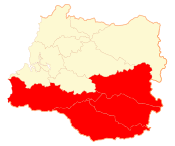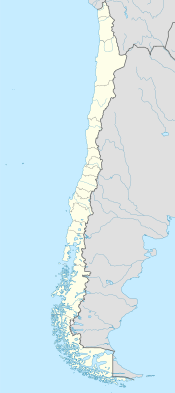El Ranco facts for kids
Quick facts for kids
El Ranco Province
Provincia del Ranco
|
||
|---|---|---|
|
||

Location in the Los Ríos Region
|
||
| Country | Chile | |
| Region | Los Ríos | |
| Capital | La Unión | |
| Communes |
List of 4:
|
|
| Government | ||
| • Type | Provincial | |
| Area | ||
| • Total | 8,232.3 km2 (3,178.5 sq mi) | |
| Population
(2012 Census)
|
||
| • Total | 91,656 | |
| • Density | 11.13371/km2 (28.8362/sq mi) | |
| • Urban | 51,273 | |
| • Rural | 45,880 | |
| Sex | ||
| • Men | 49,485 | |
| • Women | 47,668 | |
| Time zone | UTC-4 (CLT) | |
| • Summer (DST) | UTC-3 (CLST) | |
| Area code(s) | 56 + 63 | |
| Website | Government of El Ranco | |
El Ranco Province (Provincia del Ranco in Spanish) is a special area in the southern part of Chile. It is one of two provinces in the Los Ríos Region. This province gets its name from Ranco Lake. This large lake is shared by two towns: Futrono and Lago Ranco.
The Bueno River flows out of Ranco Lake. Most of the province is located in the area around this river. The main city and capital of El Ranco Province is La Unión.
Contents
How El Ranco Province is Managed
El Ranco Province is an important administrative division in Chile. It is divided into smaller areas called communes. Each commune has its own local government, called a municipality. The person in charge of the whole province is called the governor. Currently, the governor is Alsono Pérez de Arce Carrasco.
Communes of El Ranco Province
The province includes four main communes:
Land and People of El Ranco
Let's look at the size of El Ranco Province and how many people live there.
Geography and Size
According to a study from 2002, El Ranco Province covers a total area of about 8,232.3 square kilometers. That's a lot of land!
Population and Demographics
In 2002, about 97,153 people lived in the province. This included 49,485 men and 47,668 women. Most people, about 51,273 (52.8%), lived in cities or towns. The rest, about 45,880 (47.2%), lived in rural areas, which are like the countryside. Between 1992 and 2002, the number of people living in the province grew by a small amount, about 1%.
See also

- In Spanish: Provincia del Ranco para niños



